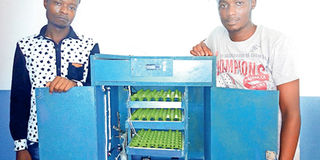Techprenuers ride high with their digital solar incubator

David Kilonzo and Antony Kiranga display their solar powered digital incubator in Mombasa. The gadget has a micro-controller which the farmer uses to set the humidity and temperature. PHOTO | DIANA MUTHEU | NATION MEDIA GROUP
What you need to know:
- The two have installed various gadgets to manage humidity, temperature and egg rotation in the incubator.
- The gadget has a small screen (micro-controller) on the front side, which the farmer uses to set the humidity and temperature.
- The techprenuers say the incubator can accommodate 90 eggs and they have used it to hatch Kienyeji eggs sourced from Kilifi.
- After the eggs have hatched, the duo conducts post-hatching care where the chicks are given starter feed, liquid paraffin and multivitamin to boost their health.
In a small at Kaa Chonjo slums in Tudor, Mombasa County, David Kilonzo, 21, and Antony Kiranga, 22, are monitoring the conditions of eggs in their solar-powered digital incubator.
The duo, who completed their studies in electrical engineering at the Technical University of Mombasa, came up with the gadget.
Their goal is to provide chick-hatching solutions to farmers especially in rural areas where there is no electricity.
The innovation started as their college project in September 2018 and they are now hoping to use it to carve a niche in the business of hatching chicks.
The two have installed various gadgets to manage humidity, temperature and egg rotation in the incubator.
“When placed in the trays, the eggs rotate automatically three times a day after eight hours. We have tested the gadget and it has 80 per cent hatching rate,” Kiranga says, noting the incubator is made from boards and hatches eggs in 21 days.
The gadget has a small screen (micro-controller) on the front side, which the farmer uses to set the humidity and temperature.
"The incubator also has small ventilations on the sides and an automatic mini-fan to control heat,” Kilonzo says, adding that the temperature should be maintained at 37.8 degrees Celsius.
“It can also inform the farmer when hatching has started through SMS. This is to ensure they monitor the process closely," Kilonzo explains.
The techprenuers say the incubator can accommodate 90 eggs and they have used it to hatch Kienyeji eggs sourced from Kilifi.
“We hatched the eggs last month and sold 50 chicks at Sh100 each. We call our project Call-Main Hatchery, which specialises in day-old Kienyeji chicks,” says Kilonzo.
SOLVING FOOD INSECURITY
According to him, egg candling is the most important process when choosing eggs to put in an incubator.
“The eggs should be fertilised, have a yolk and be very fresh," he says. Through candling, a farmer will choose eggs that are fit for hatching.
“We also train farmers on egg recycling. For instance, the egg shells can be used in making manure,” he adds.
After the eggs have hatched, the duo conducts post-hatching care where the chicks are given starter feed, liquid paraffin and multivitamin to boost their health.
The techies observe that the incubator can be used even in small spaces and in rural areas with a solar panel or battery.
“The solar panel we are using is 120 watts and the battery 100 amp per hour. Solar power is renewable energy and it is rare to experience a blackout with it, which affects hatchability,” says Kiranga.
He notes that some of their customers raised concerns about the wood board being attacked by termites.
“We have decided to import plastic compartments from China, which we will assemble and incorporate into our gadget."
The duo is selling the gadgets at Sh35,000 and recently exported one complete with a solar power at Sh45,000.
The innovation has won the hearts of many as the two are getting a lot of orders but lack resources to process them.
In January 2019, the two presented their project in a competition hosted by Tech-Bridge and emerged tops.
They also showcased it during the recent Mombasa agricultural show and got a trophy for being the second best project aimed at solving food security.
In addition, they won a price at a recent competition at Ratna square in Mombasa dubbed Leap2, which was hosted by Close The Gap (CTG).
They are ready to partner with other agribusiness enthusiasts and investors to help them mass-produce their technology to reach many farmers.



